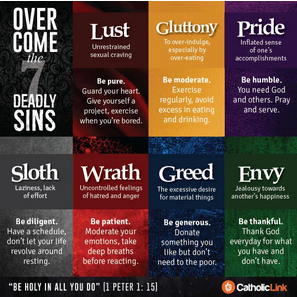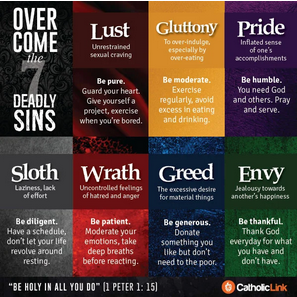- Lust
- Gluttony
- Pride
- Sloth
- Wrath
- Greed
- Envy

Lust is an intense desire or craving, particularly of a sexual nature. Here are seven examples illustrating different aspects or manifestations of lust:
- Physical Attraction: Feeling a strong, visceral urge toward someone based primarily on their physical appearance or sexual allure.
- Obsessive Thoughts: Constantly thinking about someone in a sexual manner, to the point where it becomes difficult to focus on anything else.
- Immediate Gratification: Seeking instant sexual satisfaction without regard for emotional connection or consequences.
- Fantasizing: Engaging in elaborate sexual fantasies involving a particular person or scenario, often fueled by lustful desires.
- Impulsivity: Acting impulsively on sexual urges without considering the potential risks or implications.
- Objectification: Viewing others solely as sexual objects for personal gratification, disregarding their humanity or individuality.
- Infidelity: Engaging in sexual activities outside of a committed relationship driven by lustful desires for someone other than one’s partner.
Lust is like having a really strong desire for someone, especially in a sexual way. Imagine seeing someone and feeling this intense pull towards them because you find them incredibly attractive. It’s when you can’t stop thinking about them in a romantic or sexual way. Sometimes it feels like you just want to be close to them physically without caring much about anything else.
You know when you daydream about being with someone in a romantic or sexual situation? That’s also lust. It’s like having those kinds of thoughts a lot, almost like they’re taking over your mind.
But it’s important to know that acting solely on these feelings without considering the other person’s feelings or the consequences isn’t a good idea. It’s like rushing into something without thinking it through, which can lead to hurting yourself or others emotionally.
And, if you’re in a relationship, giving in to lustful desires for someone other than your partner can really damage the trust and connection you have with them. So, it’s important to be aware of these feelings and handle them responsibly.
- Physical Attraction: Imagine you see someone at school, and you’re immediately drawn to them because you find them really attractive. You can’t stop thinking about how cute or handsome they are, and you just want to be near them all the time.
- Daydreaming: You might find yourself daydreaming about being with that person romantically or sexually. You imagine going on dates with them, kissing them, or even more intimate stuff.
- Impulsivity: Let’s say you’re at a party and you feel a strong urge to kiss someone you’ve just met, even though you don’t know them well. That could be because of lust—it’s like your body just wants to act on those feelings without thinking about the consequences.
- Fantasizing: You might have fantasies about someone you like, imagining being intimate with them in different scenarios. It’s like creating stories in your mind about being with them in a romantic or sexual way.
- Objectification: Sometimes, you might catch yourself thinking about someone only in terms of their looks or how they make you feel physically. You might forget that they’re a whole person with thoughts, feelings, and a personality beyond just their appearance.
- Infidelity: Let’s say you’re in a relationship with someone, but you find yourself attracted to someone else. Acting on those feelings by flirting or being physically intimate with that other person would be an example of letting lust guide your actions instead of being loyal to your partner.
- Physical Urges: You might feel a strong physical urge to touch someone or be close to them, even if you don’t have a deep emotional connection with them. It’s like your body is craving that physical contact because of the intense attraction you feel.
